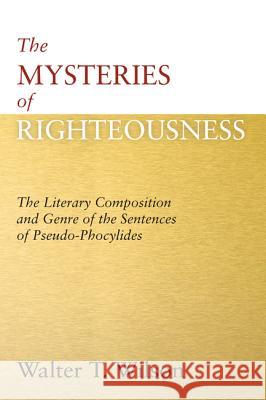The Mysteries of Righteousness » książka
The Mysteries of Righteousness
ISBN-13: 9781620329009 / Angielski / Miękka / 2013 / 247 str.
Endorsements: The Sentences of Pseudo-Phocylides, a Hellenistic Jewish didactic poem of some 230 lines probably written in Alexandria during the first century CE, is increasingly recognized as a valuable source for understanding various facts of Second Temple Judaism and early Christianity. Read one way, it appears to be a miscellany of wisdom sayings and moral exhortations that express widely held values among both Jews and pagans during the Greco-Roman period and, as such, reflects little organizational structure. Wilson contest this way of construing the work. Where others have seen chaos, he sees order. Thus, instead of seeing the work as a loosely organized ""gnomic anthology,"" he argues that ""the poem has been designed in a fairly sophisticated and systematic manner according to certain literary and argumentative strategies familiar from contemporaneous gnomic, parenetic, and philosophical sources"" (p. 178). Carl R. Holladay, Candler School of Theology, Emory University, Atlanta About the Contributor(s): Dr. Walter T. Wilson is Professor of New Testament at the Candler School of Theology at Emory University.
Endorsements:The Sentences of Pseudo-Phocylides, a Hellenistic Jewish didactic poem of some 230 lines probably written in Alexandria during the first century CE, is increasingly recognized as a valuable source for understanding various facts of Second Temple Judaism and early Christianity. Read one way, it appears to be a miscellany of wisdom sayings and moral exhortations that express widely held values among both Jews and pagans during the Greco-Roman period and, as such, reflects little organizational structure. Wilson contest this way of construing the work. Where others have seen chaos, he sees order. Thus, instead of seeing the work as a loosely organized ""gnomic anthology,"" he argues that ""the poem has been designed in a fairly sophisticated and systematic manner according to certain literary and argumentative strategies familiar from contemporaneous gnomic, parenetic, and philosophical sources"" (p. 178).Carl R. Holladay, Candler School of Theology, Emory University, AtlantaAbout the Contributor(s):Dr. Walter T. Wilson is Professor of New Testament at the Candler School of Theology at Emory University.











